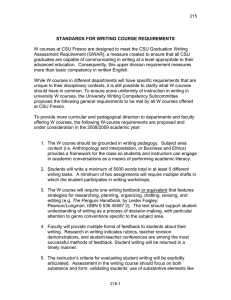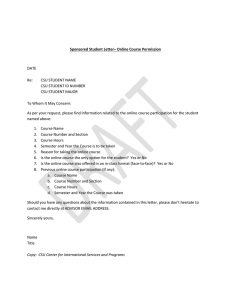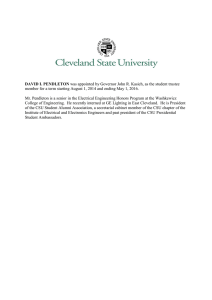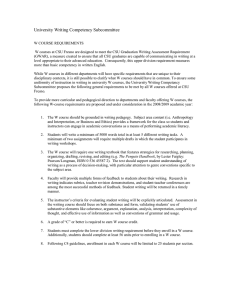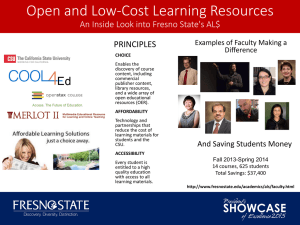Healthy News 2010-2011 California Pre-Doctoral Scholars
advertisement
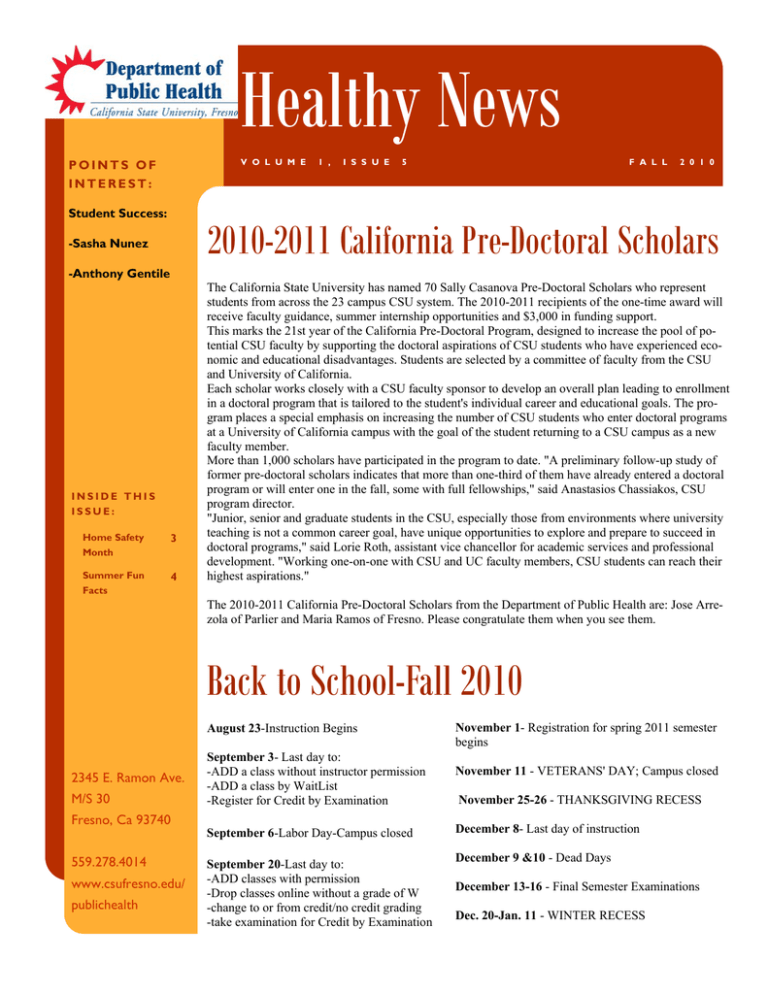
Healthy News V O L U M E POINTS OF INTEREST: Student Success: 1 , I S S U E 5 F A L L 2 0 1 0 2010-2011 California Pre-Doctoral Scholars -Sasha Nunez -Anthony Gentile INSIDE THIS ISSUE: Home Safety Month 3 Summer Fun Facts 4 The California State University has named 70 Sally Casanova Pre-Doctoral Scholars who represent students from across the 23 campus CSU system. The 2010-2011 recipients of the one-time award will receive faculty guidance, summer internship opportunities and $3,000 in funding support. This marks the 21st year of the California Pre-Doctoral Program, designed to increase the pool of potential CSU faculty by supporting the doctoral aspirations of CSU students who have experienced economic and educational disadvantages. Students are selected by a committee of faculty from the CSU and University of California. Each scholar works closely with a CSU faculty sponsor to develop an overall plan leading to enrollment in a doctoral program that is tailored to the student's individual career and educational goals. The program places a special emphasis on increasing the number of CSU students who enter doctoral programs at a University of California campus with the goal of the student returning to a CSU campus as a new faculty member. More than 1,000 scholars have participated in the program to date. "A preliminary follow-up study of former pre-doctoral scholars indicates that more than one-third of them have already entered a doctoral program or will enter one in the fall, some with full fellowships," said Anastasios Chassiakos, CSU program director. "Junior, senior and graduate students in the CSU, especially those from environments where university teaching is not a common career goal, have unique opportunities to explore and prepare to succeed in doctoral programs," said Lorie Roth, assistant vice chancellor for academic services and professional development. "Working one-on-one with CSU and UC faculty members, CSU students can reach their highest aspirations." The 2010-2011 California Pre-Doctoral Scholars from the Department of Public Health are: Jose Arrezola of Parlier and Maria Ramos of Fresno. Please congratulate them when you see them. Back to School-Fall 2010 August 23-Instruction Begins 2345 E. Ramon Ave. M/S 30 September 3- Last day to: -ADD a class without instructor permission -ADD a class by WaitList -Register for Credit by Examination Fresno, Ca 93740 September 6-Labor Day-Campus closed 559.278.4014 www.csufresno.edu/ publichealth September 20-Last day to: -ADD classes with permission -Drop classes online without a grade of W -change to or from credit/no credit grading -take examination for Credit by Examination November 1- Registration for spring 2011 semester begins November 11 - VETERANS' DAY; Campus closed November 25-26 - THANKSGIVING RECESS December 8- Last day of instruction December 9 &10 - Dead Days December 13-16 - Final Semester Examinations Dec. 20-Jan. 11 - WINTER RECESS PAGE Alumni Update-Sasha Nunez 2 “I’ve also had the opportunity to meet some key Federal representatives working closely with the nation’s health center community.” Sasha Nunez Public Health Alumnus Class of 2004 As a Program Development and Evaluation Consultant I have had the chance to travel to Portland, Oregon and attended the “Developing Effective Federally Qualified Health Centers” training put on by the National Association of Community Health Centers (NACHC) on my own tab; I also traveled to Las Vegas, Nevada and attended the “Financial, Operations Management & Information Technology Conference” put on also by NACHC and paid for by one of my clients. These have turned out to be great experiences for my professional expertise and for networking. I’ve also had the opportunity to meet some key Federal representatives working closely with the nation’s health center community. I’ve learned a lot about having my own business as an Independent Consultant. I’ve learned that cash flow is not consistent; retaining my per diem position at Community Regional Medical Center as a Lactation Specialist has been financially helpful. I enjoy my work schedule flexibility; I can work early in the morning or until late at night and be completely free during the day. I can’t think of a more flexible schedule for raising three little girls and keeping up with my home responsibilities. My personal motto, since December 2004, has been “Family First” and it will continue to be until I retire. God has blessed me in this and I know that He will continue to provide the needed grants and assessment projects at the right time. Student Success-Anthony Gentile Anthony Gentile, a recent MPH graduate (Class of 2010), has started his health promotion career as a Health Educator at Vandenberg Air Force Base. His function as a Health Educator is to ensure that the active military members are fit and healthy for their roles within the military. The main focus of this position is nutrition education, fitness and smoking cessation. Working with a registered dietician and an exercise physiologist, he challenges the airmen to participate in recreational opportunities. His educational experience has prepared him to meet the challenges that are asked of him looking for ways to facilitate healthy behavior change. HEALTH Maria Lorena Ramos: 2010-2011 Pre-Doctoral Scholar Maria Lorena Ramos, one of the two recipients of the Sally Casanova, Pre-doctoral scholarship, is a third year Master of Public Health student. As part of the scholarship activities she plans to visit doctoral granting institutions in and outside of the State of California. She will attend the American Public Health Association national conference in Colorado and subscribe to professional journals in the area of health. Ms. Ramos will also participate in a summer long internship, conducting research in a university of her choice within the Country. Lorena’s area of interest is complementary and alternative medicine and its contributions to public health. Lorena’s academic and professional achievements include receiving the Undergraduate Dean’s Medal for the College of Health and Human Services, nomination for the Undergraduate Dean’s Medal for the Division of Student Affairs, recipient of the Graduate Equity Fellowship, and recipient of the CANFIT Nutrition, Physical Education and Culinary Arts Scholarship. Professionally, she has reached hundreds of community members and has collaborated with organizations in the San Joaquin Valley, the State of California and National entities. She has worked with youth and adults through programs, and organizations like the California State University, Fresno-University Outreach Services, and the Central California Obesity Prevention Program. She has contributed in health related research projects funded by the Central California Center for Health and Human Services and the University of California, Berkley’s Health Initiative of the Americas Grant. Currently, Ms. Ramos works as a health educator for migrant children and adults in Fresno County through the Fresno County of Education, Migrant Program- Region IV. Ms. Ramos received the United State’s President’s Volunteer Service Award for her service to the community in 2007. She is also a member of the American Public Health Association, the Phi Kappa Phi Honor Society and the Golden Key International Honour Society. August is National Immunization Awareness Month Why are immunizations important? Immunization is one of the most significant public health achievements of the 20th century. Vaccines have eradicated smallpox, eliminated wild poliovirus in the United States. and significantly reduced the number of cases of measles, diphtheria, rubella, pertussis and other diseases. But despite these efforts, people in the U.S. still die from these and other vaccine-preventable diseases. Vaccines offer safe and effective protection from infectious diseases. By staying up-to-date on the recommended vaccines, individuals can protect themselves, their families and friends and their communities from serious, life-threatening infections. Who should be immunized? Getting immunized is a lifelong, life-protecting community effort regardless of age, sex, race, ethnic background or country of origin. Recommended vaccinations begin soon after birth and continue throughout life. Being aware of the vaccines that are recommended for infants, children, adolescents, adults of all ages and seniors, and making sure that we receive these immunizations, are critical to protecting ourselves and our communities from disease. When are immunizations given? Because children are particularly vulnerable to infection, most vaccines are given during the first five to six years of life. Other immunizations are recommended during adolescent or adult years and, for certain vaccines, booster immunization are recommended throughout life. Vaccines against certain diseases that may be encountered when traveling outside of the U.S. are recommended for travelers to specific regions of the world. Source: http://www.cdc.gov/vaccines/events/niam/default.htm PAGE 4 Summer Fun Facts Watermelon is actually a VEGETABLE! It is from the botani‐ cal family Cucurbitaceae and is most closely related to cu‐ cumbers, pumpkins and squash. The watermelon is com‐ posed of 92 percent water and early explorers often used hollowed out watermelons as canteens. Lifesavers candy has a hole in the middle primarily because of a machine malfunction, but the manu‐ facturers thought it was a good idea, so they kept it that way. The liquid inside a young coconut can be used as a replacement for blood plasma. The book Gadsby has over 50,000 words, and none of them have the letter E. There are 293 ways to make change for one dollar. The average person says 5,000 words in one day. Summer Fun Facts Compiled from FamilyEducation.com
